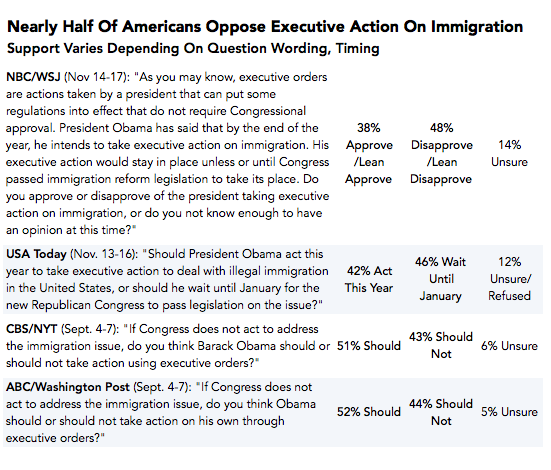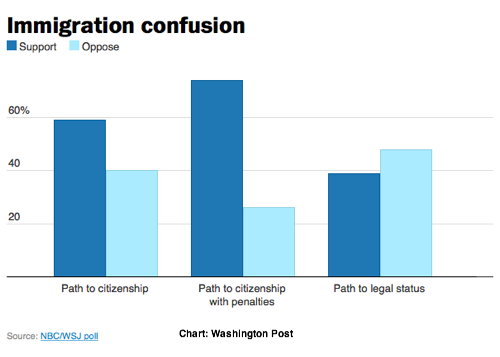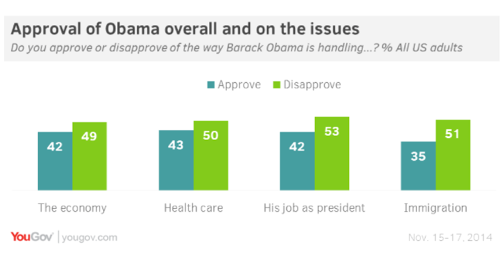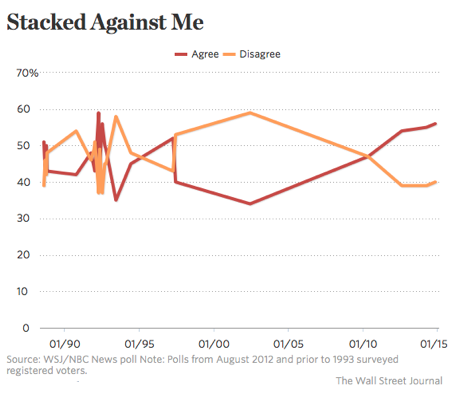Americans support the immigration policies President Obama is putting into place, but nearly half oppose the way he's doing it. Climate change is considered a bigger threat abroad than at home. And Democrats also shared internal data via Twitter. This is HuffPollster for Friday, November 21, 2014.
EXECUTIVE ACTION ON IMMIGRATION: HOW WILL AMERICANS REACT? - President Obama announced plans on Thursday night to use executive action to provide deportation relief to undocumented immigrants. Four polls have attempted to gauge public reaction to a potential use of executive action by the President with mixed results. The most recent effort, by the NBC News/Wall Street Journal poll involved a three sentence introduction that explained both the general concept of presidential executive orders and summarized Obama's rationale for action. It found net disapproval (48 to 38 percent) of executive action but also considerable uncertainty. Roughly a quarter of Americans (26 percent) were either completely unsure (14 percent) or offered an opinion only after being pushed for how the "lean." NBC's Mark Murray: "Not surprisingly, these numbers largely break along partisan lines: 63 percent of Democrats approve of Obama taking executive action here, versus just 11 percent of Republicans and 37 percent of independents." [NBC News]

Questions asked by the ABC/Washington Post and CBS/New York Times polls in September found net support, but these did not define the meaning of "executive action" and asked more simply if Obama should take action "if Congress does not act to address the immigration issue." A similarly worded A USA Today poll question asked in November found net opposition, but posed executive action by the President against waiting "for the new Republican Congress to pass legislation" in January. [NYT, WashPost, USA Today, see also Polling Report]
Most polls show majority support for a path to legal status - Scott Clement: "A single NBC/WSJ poll released this week finds a 35-percentage point difference in support for a path to legal status versus a path to citizenship, depending on how the question is worded. The wide variation is nothing new. Americans' support legal status more when significant strings are attached. A big reason for the differences in [these findings] is the number of hoops that illegal immigrants need to jump through. Polls show Americans are most likely to support legalization policies that impose significant hurdles for undocumented immigrants to gain legal status. The below table from earlier this year shows how a path to legal status fared in polls, depending on the question wording. This is in part why the 2013 comprehensive Senate bill polled extremely well -- lots of specifics on the path to citizenship. A key issue to watch in Obama’s executive action is what requirements (if any) will be needed for undocumented immigrants to avoid deportation. The more, the better -- at least as far as public perception goes." [WashPost]
Immigration increasingly viewed as important - Pew Research: "A growing share of Americans views the passage of immigration legislation as an important priority. About six-in-ten (61%) Americans said in aJuly survey that passage of significant new legislation on immigration was extremely or very important. That view was held by similar shares of Democrats, Republicans and independents. However, when it comes to specifics of policy changes, the nation is divided along party lines. About two-thirds (66%) of Hispanic registered voters said in a Sept.-Oct. survey that passing new immigration legislation soon is extremely important or very important. Republicans are more likely to say tougher law enforcement and stepped up border security is the top priority. Democrats are more likely to favor putting equal priority on tougher enforcement as well as finding a way for those in the U.S. illegally to become citizens." [Pew]
Obama's ratings are lowest on immigration - Kathy Frankovic: "The president’s approval rating on immigration lags behind his ratings on the economy and health care, especially among Democrats...Barely a third of the country in the latest Economist/YouGov Poll approve of the way he is handling immigration, fewer than approve on other major concerns like the economy and health care, or approve overall. More than four in ten approve of the president’s overall performance, his handling of the economy, and his performance on health care. About half disapprove of all three. [YouGov]
How will Latinos respond? - Matt Barreto: "Polling data suggest that the response from Latinos to this announcement will be overwhelmingly positive. Latino Decisions' 2014 election eve survey found that 58 percent of Latino voters personally know at least one undocumented immigrant. In our June 2014 national poll on behalf of the Center for American Progress, we found that 87 percent of Latinos supported the president's use of executive authority to provide relief from deportation for undocumented immigrants who have U.S. born children. In the Latino community, almost everybody supports keeping families together...The GOP is treading on very thin ice with Latinos, and if the party aggressively opposes -- legally, or even rhetorically -- the president's immigration actions, Republicans risk solidifying their anti-immigrant image with Latinos, and also Asian Americans." [HuffPost]
What impact on 2016? - Nate Cohn: "[A] a close look at demographic data and recent election results suggest that the Republicans do not necessarily need significant gains among Hispanic voters to win the presidency. Yes, the next Republican presidential candidate will be making a big gamble if he or she doesn’t make meaningful gains among Hispanic voters, especially in Florida. But the Hispanic vote cannot single-handedly determine the presidency, as one could be forgiven for believing based on post-2012 election commentary. The Republicans have a path to the White House without Hispanic voters. It’s just a harder one....Hispanics represent more than 5 percent of eligible voters in just three battlegrounds: Florida, Nevada and Colorado....[I]f the Republicans don’t make any gains among Hispanic voters, they will be taking a big risk. Hispanic voters are still important — and it’s easy to imagine a situation in which Republican gains among Hispanics are in fact necessary to win. That situation turns on Florida. The Republicans don’t have an especially credible path to the presidency without Florida’s 29 electoral votes....Florida was the closest state of the 2012 presidential election, and Hispanics will most likely represent 19 percent of eligible voters in 2016, up from 17 percent in 2012." [NYT]
AMERICANS SEE CLIMATE CHANGE AS A BIGGER RISK TO OTHER COUNTRIES - PRRI: "In the wake of a climate deal with China and congressional vote on the Keystone XL pipeline, a new national survey finds that few Americans believe they will personally be harmed by climate change but that it poses significant risk to people in poorer countries. The PRRI/AAR Religion, Values and Climate Change Survey finds that less than one-quarter (24 percent) of Americans believe that they will be personally harmed a great deal by climate change, while 30 percent say climate change will affect them a moderate amount. Nearly half say climate change will cause them little (23 percent) or no (22 percent) harm. In contrast, a majority (54 percent) of Americans say that people living in poorer developing countries will be harmed a great deal as a result of climate change, while 20 percent say people in developing countries will experience a moderate amount of harm….On policy, the survey finds a majority (52 percent) of Americans support the building of the Keystone XL pipeline with 37 percent of Americans opposed. At the same time, nearly 6-in-10 (57 percent) Americans favor stricter limits on the amount of carbon dioxide emitted from power plants even if they raise the price of goods and services, while 38 percent of Americans are opposed." [PRRI]
MOST UNINSURED UNAWARE OF OPEN ENROLLMENT START - Kaiser Family Foundation: "The latest Kaiser Health Tracking Poll finds that just prior to the Affordable Care Act (ACA) open enrollment beginning this past Saturday, the uninsured remained largely unaware of its start, although about half of the uninsured expect to get health insurance in the next few months and seven in ten say that health insurance is something they need. Opinion on the law remains similar to past months – 46 percent say they have an unfavorable view of the law and 37 percent say they have a favorable view. Americans are divided as to what Congress should do next on the law – 29 percent say they support repealing the law entirely, 17 percent say they support scaling back what the law does, 20 percent support moving ahead with the law as is, and 22 percent feel that the law should be expanded." [KFF]
-Bill Gardner offers two data-based explanations for why opposition to the ACA remains strong and consistent. [Accidental Economist]
MOST SEE SYSTEM 'STACKED AGAINST' THEM - Neil King: "At last, we have an important question upon which a majority of Americans—regardless of race, political persuasion or walk of life—agree. Are the country’s economic and political systems stacked against people like you? Yes, say 56% of Americans, according to the latest Wall Street Journal/NBC News poll....Among those saying the system is stacked against them are 58% of Democrats; 51% of Republicans; 55% of whites; 60% of blacks; 53% of Hispanics; as well as decent majorities of every age and professional cluster, including blue-collar workers, white-collar workers and retirees." [WSJ]
DEMOCRATS ALSO SHARED CAMPAIGN DATA VIA TWITTER - Paul Blumenthal: “ Republican Party committees and outside groups shared polling data over Twitter during the 2014 elections, according to a CNN report on Monday. The purpose was to circumvent federal anti-coordination rules -- and the practice appeared to be part of a growing bipartisan effort to get around those rules by posting information in public. While those Republican accounts have garnered the attention since the CNN report, they were not the first use of Twitter by a party committee to hide coordination in plain sight. In 2012, the Democratic Party shared information about advertising buys through a seemingly unconnected Twitter account called AdBuyDetails. This account, which posted tweets from Aug. 31 until Oct. 23, 2012, sent out data on ad buys made by Democratic House candidates in tight races across the country.” [HuffPost]
HUFFPOLLSTER VIA EMAIL! - You can receive this daily update every weekday morning via email! Just click here, enter your email address, and and click "sign up." That's all there is to it (and you can unsubscribe anytime).
FRIDAY’S 'OUTLIERS' - Links to the best of news at the intersection of polling, politics and political data:
-Consumers now hold the most favorable economic expectations since 2007. [University of Michigan via @OpinionToday]
-Most New Yorkers are not worried about getting Ebola. [Quinnipiac]
-Americans' ratings of the Centers for Disease Control declined over the past year. [Gallup]
-Harry Enten finds pollsters cheated themselves in Virginia. [538]
-Phillip Bump illustrates why turnout won't solve the Democrats' problem with working class white voters. [WashPost]
-Charles Franklin finds evidence that his Marquette University Law School poll likely voter screen worked well. [@PollsAndVotes here and here]
-Alex Lundry (R) finds truth on the wall of a focus group facility. [@alexlundry]



